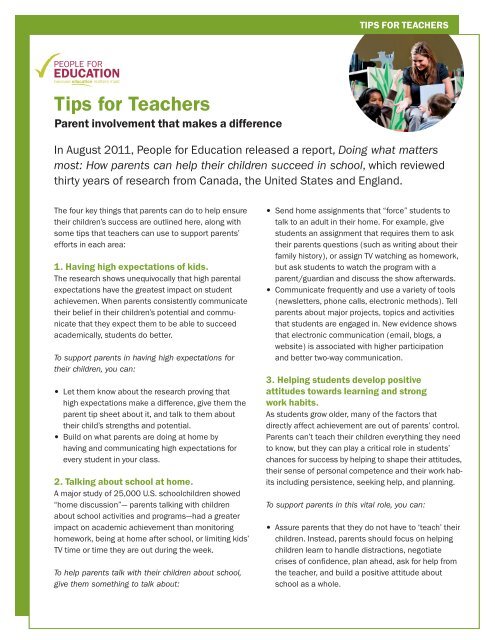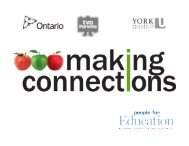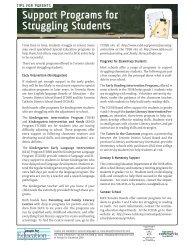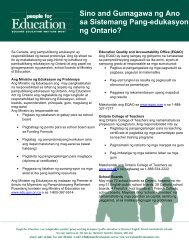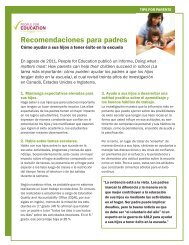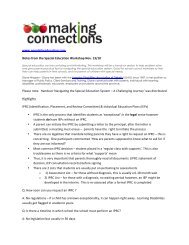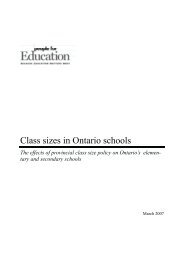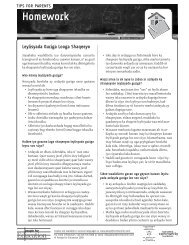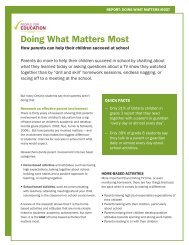Tips for Teachers - People for Education
Tips for Teachers - People for Education
Tips for Teachers - People for Education
Create successful ePaper yourself
Turn your PDF publications into a flip-book with our unique Google optimized e-Paper software.
TIPS FOR TEACHERS<br />
<strong>Tips</strong> <strong>for</strong> <strong>Teachers</strong><br />
Parent involvement that makes a difference<br />
In August 2011, <strong>People</strong> <strong>for</strong> <strong>Education</strong> released a report, Doing what matters<br />
most: How parents can help their children succeed in school, which reviewed<br />
thirty years of research from Canada, the United States and England.<br />
The four key things that parents can do to help ensure<br />
their children’s success are outlined here, along with<br />
some tips that teachers can use to support parents’<br />
ef<strong>for</strong>ts in each area:<br />
1. Having high expectations of kids.<br />
The research shows unequivocally that high parental<br />
expectations have the greatest impact on student<br />
achievemen. When parents consistently communicate<br />
their belief in their children’s potential and communicate<br />
that they expect them to be able to succeed<br />
academically, students do better.<br />
To support parents in having high expectations <strong>for</strong><br />
their children, you can:<br />
• Let them know about the research proving that<br />
high expectations make a difference, give them the<br />
parent tip sheet about it, and talk to them about<br />
their child’s strengths and potential.<br />
• Build on what parents are doing at home by<br />
having and communicating high expectations <strong>for</strong><br />
every student in your class.<br />
2. Talking about school at home.<br />
A major study of 25,000 U.S. schoolchildren showed<br />
“home discussion”— parents talking with children<br />
about school activities and programs—had a greater<br />
impact on academic achievement than monitoring<br />
homework, being at home after school, or limiting kids’<br />
TV time or time they are out during the week.<br />
To help parents talk with their children about school,<br />
give them something to talk about:<br />
• Send home assignments that “<strong>for</strong>ce” students to<br />
talk to an adult in their home. For example, give<br />
students an assignment that requires them to ask<br />
their parents questions (such as writing about their<br />
family history), or assign TV watching as homework,<br />
but ask students to watch the program with a<br />
parent/guardian and discuss the show afterwards.<br />
• Communicate frequently and use a variety of tools<br />
(newsletters, phone calls, electronic methods). Tell<br />
parents about major projects, topics and activities<br />
that students are engaged in. New evidence shows<br />
that electronic communication (email, blogs, a<br />
website) is associated with higher participation<br />
and better two-way communication.<br />
3. Helping students develop positive<br />
attitudes towards learning and strong<br />
work habits.<br />
As students grow older, many of the factors that<br />
directly affect achievement are out of parents’ control.<br />
Parents can’t teach their children everything they need<br />
to know, but they can play a critical role in students’<br />
chances <strong>for</strong> success by helping to shape their attitudes,<br />
their sense of personal competence and their work habits<br />
including persistence, seeking help, and planning.<br />
To support parents in this vital role, you can:<br />
• Assure parents that they do not have to ‘teach’ their<br />
children. Instead, parents should focus on helping<br />
children learn to handle distractions, negotiate<br />
crises of confidence, plan ahead, ask <strong>for</strong> help from<br />
the teacher, and build a positive attitude about<br />
school as a whole.
TIPS FOR TEACHERS<br />
The evidence is clear. Parents do more<br />
to help their children succeed in school<br />
by chatting about what they learned<br />
today or reading them a story, than by<br />
“drill and skill” homework sessions,<br />
endless nagging, or racing off to a<br />
meeting at the school.<br />
It goes without saying that it is vital to treat all parents<br />
with respect. When parents are treated respectfully<br />
by the school, it is easier <strong>for</strong> them to instil a positive<br />
attitude towards schooling in their children. And just<br />
as teachers try not to make assumptions about, or<br />
pre-judge their students, it is important not to make<br />
assumptions about parents based on things like their<br />
participation in school events or their socio-economic<br />
status.<br />
• Provide helpful tips to both parents and students<br />
about using their agendas effectively, planning <strong>for</strong><br />
large assignments, preparing <strong>for</strong> exams, etc.<br />
4. Reading with children.<br />
Parents make a major difference by reading and<br />
talking about books and stories with their children.<br />
The skills that children learn at school are vital, but<br />
the motivation, comprehension and strong oral<br />
language skills children develop through conversation<br />
and reading together with adults at home are crucial<br />
foundations <strong>for</strong> successful literacy.<br />
To encourage parents to read with their children,<br />
you can:<br />
• Make sure they have something enjoyable to read!<br />
Send books home and encourage families to use<br />
both the school and public libraries.<br />
• Encourage parents to instil a love of reading by<br />
making it fun and enjoyable, instead of focussing on<br />
the mechanics of reading (sounding out words, etc.)<br />
or homework assignments connected to reading.<br />
For more in<strong>for</strong>mation:<br />
Visit www.people<strong>for</strong>education.ca to read Doing what matters<br />
most: How parents can help their children succeed in school.<br />
You will also find resources to help you communicate with<br />
parents, the full bibliography <strong>for</strong> the report, tip sheets in 15<br />
languages, education research, and answers to frequently<br />
sked questions.<br />
<strong>Teachers</strong>’ Federations<br />
The Elementary <strong>Teachers</strong>’ Federation of Ontario (ETFO) has in<strong>for</strong>mation<br />
about engaging parents in its “Research <strong>for</strong> <strong>Teachers</strong>”<br />
(www.etfo.ca).<br />
Ontario English Catholic <strong>Teachers</strong> Association (OECTA) has<br />
a resource called “Positive, Professional Parent Teacher<br />
Relationships” (www.oecta.on.ca).<br />
The Ontario Secondary School <strong>Teachers</strong> Federation (OSSTF) has<br />
in<strong>for</strong>mation <strong>for</strong> parents on its website (www.osstf.on.ca).<br />
Research Sites<br />
The SEDL National Centre <strong>for</strong> Family and Community<br />
Connections with Schools (http://www.sedl.org/connections/<br />
research-syntheses.html) and the Harvard Family Research<br />
Project (http://www.hfrp.org/family-involvement) have<br />
excellent, free research materials online.<br />
School practices make a difference.<br />
The good news: <strong>Teachers</strong> can influence what parents<br />
do at home.<br />
But educators need to be cautious about adopting<br />
parent involvement strategies that seem to give parents<br />
homework, because the research clearly shows<br />
that the most effective parent involvement is centred<br />
on parents’ interaction with their children as parents,<br />
rather than parents “teaching” their children.<br />
<strong>People</strong> <strong>for</strong> <strong>Education</strong> is your strong voice <strong>for</strong> public education.<br />
We conduct vital research, answer parents’ questions, make policy<br />
recommendations and ensure there is broad coverage of education<br />
issues in the media. Together we make Ontario’s schools great!<br />
<strong>People</strong> <strong>for</strong> <strong>Education</strong><br />
641 Bloor Street West, Toronto, ON<br />
M6G 1L1 Tel. 416-534-0100<br />
www.people<strong>for</strong>education.ca


